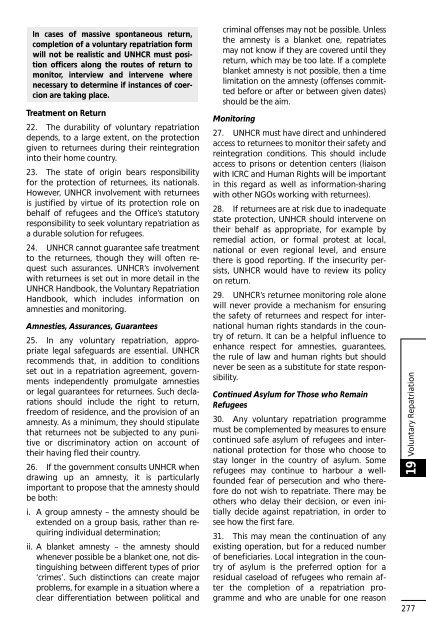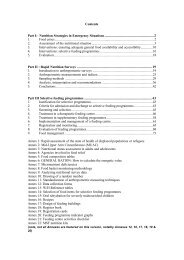UNHCR Handbook for Emergencies - UNHCR eCentre
UNHCR Handbook for Emergencies - UNHCR eCentre
UNHCR Handbook for Emergencies - UNHCR eCentre
Create successful ePaper yourself
Turn your PDF publications into a flip-book with our unique Google optimized e-Paper software.
In cases of massive spontaneous return,<br />
completion of a voluntary repatriation <strong>for</strong>m<br />
will not be realistic and <strong>UNHCR</strong> must position<br />
officers along the routes of return to<br />
monitor, interview and intervene where<br />
necessary to determine if instances of coercion<br />
are taking place.<br />
Treatment on Return<br />
22. The durability of voluntary repatriation<br />
depends, to a large extent, on the protection<br />
given to returnees during their reintegration<br />
into their home country.<br />
23. The state of origin bears responsibility<br />
<strong>for</strong> the protection of returnees, its nationals.<br />
However, <strong>UNHCR</strong> involvement with returnees<br />
is justified by virtue of its protection role on<br />
behalf of refugees and the Office’s statutory<br />
responsibility to seek voluntary repatriation as<br />
a durable solution <strong>for</strong> refugees.<br />
24. <strong>UNHCR</strong> cannot guarantee safe treatment<br />
to the returnees, though they will often request<br />
such assurances. <strong>UNHCR</strong>’s involvement<br />
with returnees is set out in more detail in the<br />
<strong>UNHCR</strong> <strong>Handbook</strong>, the Voluntary Repatriation<br />
<strong>Handbook</strong>, which includes in<strong>for</strong>mation on<br />
amnesties and monitoring.<br />
Amnesties, Assurances, Guarantees<br />
25. In any voluntary repatriation, appropriate<br />
legal safeguards are essential. <strong>UNHCR</strong><br />
recommends that, in addition to conditions<br />
set out in a repatriation agreement, governments<br />
independently promulgate amnesties<br />
or legal guarantees <strong>for</strong> returnees. Such declarations<br />
should include the right to return,<br />
freedom of residence, and the provision of an<br />
amnesty. As a minimum, they should stipulate<br />
that returnees not be subjected to any punitive<br />
or discriminatory action on account of<br />
their having fled their country.<br />
26. If the government consults <strong>UNHCR</strong> when<br />
drawing up an amnesty, it is particularly<br />
important to propose that the amnesty should<br />
be both:<br />
i. A group amnesty – the amnesty should be<br />
extended on a group basis, rather than requiring<br />
individual determination;<br />
ii. A blanket amnesty – the amnesty should<br />
whenever possible be a blanket one, not distinguishing<br />
between different types of prior<br />
‘crimes’. Such distinctions can create major<br />
problems, <strong>for</strong> example in a situation where a<br />
clear differentiation between political and<br />
criminal offenses may not be possible. Unless<br />
the amnesty is a blanket one, repatriates<br />
may not know if they are covered until they<br />
return, which may be too late. If a complete<br />
blanket amnesty is not possible, then a time<br />
limitation on the amnesty (offenses committed<br />
be<strong>for</strong>e or after or between given dates)<br />
should be the aim.<br />
Monitoring<br />
27. <strong>UNHCR</strong> must have direct and unhindered<br />
access to returnees to monitor their safety and<br />
reintegration conditions. This should include<br />
access to prisons or detention centers (liaison<br />
with ICRC and Human Rights will be important<br />
in this regard as well as in<strong>for</strong>mation-sharing<br />
with other NGOs working with returnees).<br />
28. If returnees are at risk due to inadequate<br />
state protection, <strong>UNHCR</strong> should intervene on<br />
their behalf as appropriate, <strong>for</strong> example by<br />
remedial action, or <strong>for</strong>mal protest at local,<br />
national or even regional level, and ensure<br />
there is good reporting. If the insecurity persists,<br />
<strong>UNHCR</strong> would have to review its policy<br />
on return.<br />
29. <strong>UNHCR</strong>’s returnee monitoring role alone<br />
will never provide a mechanism <strong>for</strong> ensuring<br />
the safety of returnees and respect <strong>for</strong> international<br />
human rights standards in the country<br />
of return. It can be a helpful influence to<br />
enhance respect <strong>for</strong> amnesties, guarantees,<br />
the rule of law and human rights but should<br />
never be seen as a substitute <strong>for</strong> state responsibility.<br />
Continued Asylum <strong>for</strong> Those who Remain<br />
Refugees<br />
30. Any voluntary repatriation programme<br />
must be complemented by measures to ensure<br />
continued safe asylum of refugees and international<br />
protection <strong>for</strong> those who choose to<br />
stay longer in the country of asylum. Some<br />
refugees may continue to harbour a wellfounded<br />
fear of persecution and who there<strong>for</strong>e<br />
do not wish to repatriate. There may be<br />
others who delay their decision, or even initially<br />
decide against repatriation, in order to<br />
see how the first fare.<br />
31. This may mean the continuation of any<br />
existing operation, but <strong>for</strong> a reduced number<br />
of beneficiaries. Local integration in the country<br />
of asylum is the preferred option <strong>for</strong> a<br />
residual caseload of refugees who remain after<br />
the completion of a repatriation programme<br />
and who are unable <strong>for</strong> one reason<br />
Voluntary Repatriation<br />
19<br />
277



